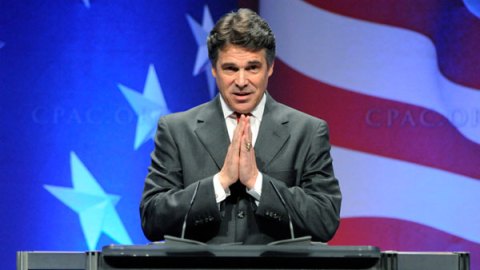What Rick Perry’s Candidacy Reveals About Polarization in America

Over the coming months, I will be blogging regularly on the topic of polarization, highlighting research and trends on the nature, causes, and possible solutions to the nation’s political paralysis. One of the causes I will be spotlighting is the growth in ideologically-driven activists and donors in each party, networks of advocates who have come to decide most primary and party-nominating contests in state and Congressional races.
The influence of these activists and donors is helped by the increasing non-competitiveness of general elections, allowing activists and informal party leaders to push through as nominees ideologically strong and faithful candidates. They are also aided in being able to use the Internet to rally small donations to their preferred candidates from similarly ideologically-like minded citizens across the country and to threaten elected officials with a primary challenge if they vote against preferred ideological goals. Cable news networks Fox and MSNBC strengthen and amplify this process as do web sites such as the Huffington Post.
As the current GOP presidential nomination race reveals, party activists and donors have an out-sized influence especially now during the early run-up to the Iowa Caucus. Candidates Michele Bachmann, Ron Paul, and Rick Perry owe their current elected seats to these combined factors, each emerging out of activist and informal party leader networks that won them their primary races, before going on to relatively non-competitive general elections. Internet donations and cable news have also fueled their rise to prominence. Similar factors and dynamics define the Democratic party.
Yet as the case of Rick Perry reveals, while this process might make for a more ideologically coherent and consistent GOP and Democratic delegation in the House and in state capitals, candidates like Perry will have a very tough time winning votes in key competitive Battleground states during the general election.
That’s one reason that as the Politicoreports today, GOP cognoscenti such as Karl Rove and Bill Kristol are still pushing for Paul Ryan and Chris Christie to get into the race. Yet it’s also the reason that as Washington Post columnist Michael Gerson laments, more moderate-leaning candidates like Tim Pawlenty, Mitt Romney, and Jon Huntsman back-away from their more pragmatic policy stands of the past and yet still have trouble passing the “purity test” of the GOP nomination contest.
From a Washington Postarticle by Dan Balz on the challenges facing Rick Perry:
Perry is a robust conservative in a GOP in which the tea party movement and social conservatives hold great sway. He is also a leader with the potential to appeal more to the party establishment, but perhaps only if he can convince Republicans that he is the most electable of their candidates.
Perry loyalists may regard the Bernanke episode as a mini-storm that will pass quickly, a blip that will be written off as part of the learning curve for a new candidate. Maybe they are correct, particularly if Perry quickly learns from the experience.
Other Republicans may see in Perry the kind of candidate they are looking for to challenge the president in the general election, someone who is tough, brash and unafraid to speak his mind — a Michele Bachmann with real executive governing experience.
Many of the attributes Perry has shown this week are ones that could make him a compelling candidate. They provide a potentially striking contrast with Romney, who is more cautious and still dogged by issues of trust and authenticity.
Romney ought to be worried. Perry showed last year, when he demolished then-Sen. Kay Bailey Hutchison in the Texas gubernatorial primary, that he knows how to beat an establishment Republican like Romney.
But is it all too much? Even before this week, there were questions from political strategists who have watched Perry as to how suited he is for a general-election campaign, in which he would have to appeal to independent voters, to suburban women around Philadelphia and Denver, to older voters in Florida, and to those who will hold the balance in swing states such as Iowa.
And Perry suffers from the inevitable comparisons with the Texan who was most recently in the Oval Office. Bush and Perry are strikingly different politicians, and in Texas the rivalry between their two camps is well known. But to the untrained ears of the national electorate, Perry may sound too much like another brash Texan for voters not eager to revisit the Bush years.
Another obstacle may be learning to broaden his appeal. Texas-based strategists say Perry has focused his campaigns almost completely on the Republican base and conservative independents. That may not be enough to win a national race, unless the dissatisfaction with the economy and Obama’s leadership make 2012 a race that is the Republicans’ to lose.
What is considered the conservative mainstream in Texas may be too conservative in other parts of America. What worked in Texas won’t necessarily work elsewhere. Being too Texan, never much of a problem at home, could hurt him nationally. Aspects of his record that Perry may assume have been fully litigated could become problems when the national spotlight begins to shine.
The Republicans who worry about Perry as a general-election candidate fear that he is too conservative on social issues, too grounded in the idiom of Texas, too enamored of his 10th Amendment, states’ rights message.
They also worry about more rhetoric like his comment about Bernanke, or his response to a reporter who asked whether he thought Obama loves America: “You need to ask him.” Or his suggestion that a president who has never worn the uniform, like Obama, may be less respected than one, like him, who has.





